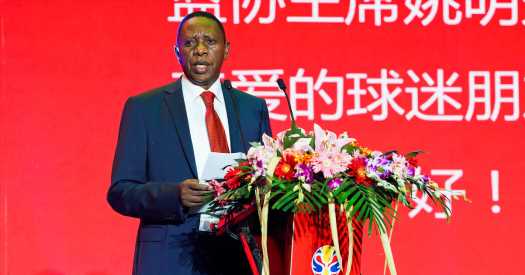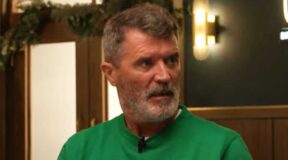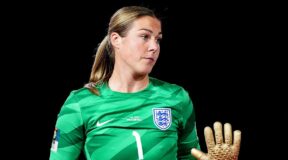The president of Mali’s basketball federation has been suspended and the West African nation’s former women’s youth national coach has been jailed on charges of sexually abusing players, according to the country’s sports ministry and the prosecutor in the assault case.
And as the Tokyo Olympics enter a second week, Human Rights Watch is pressuring Hamane Niang, the beleaguered president of FIBA, basketball’s world governing body, to resign or be permanently removed from the sport’s highest-ranking international position.
Niang, 69, stepped aside, at least temporarily, as FIBA president in mid-June, as The New York Times prepared to publish its investigation into allegations of systemic sexual harassment and abuse of dozens of female players in Mali, the majority of them teenagers, at least since the early 2000s.
Niang is a former sports minister and basketball federation president in Mali, where the sport remains engulfed in turmoil days before its women’s youth national team is scheduled to participate in the U-19 World Cup. The tournament begins Aug. 7 in Hungary.
Several of Niang’s friends and associates have been implicated. Given his position as FIBA’s top official and his ties to Mali, Niang knew or should have known about accusations of sexual abuse in the country and attempts to cover them up, said Minky Worden, the director of global initiatives for Human Rights Watch, which has also investigated accusations of abuse in Mali.
“Niang should not be in office one more day,” Worden said in an interview on Thursday.
Niang has denied any wrongdoing, telling The Times in June, “I never had knowledge in any way of the accusations described in your correspondence.” FIBA said it would not comment until an independent investigation is completed.
Human Rights Watch, and other members of a coalition called the Sports and Rights Alliance, sent a letter to FIBA on Thursday, expressing concern that victims of abuse who have spoken out are facing retaliation and are under threat while being considered “enemies of Mali.”
The coalition, supported by the W.N.B.A. Players Association, said it feared that “powerful forces are working to silence” victims.
Niang is not accused of committing sexual abuse. But his critics, including activists, former players and a former basketball league president, say he largely ignored the assault of women for a dozen years between 1999 and 2011, when he served as a leading sports figure in the Mali.
But one of Niang’s successors as the top basketball official in Mali — and whose family has prominent FIBA connections — has become the latest official to be sanctioned in the abuse scandal.
Harouna Maiga has been temporarily suspended by FIBA as president of the Mali basketball federation, the country’s sports ministry said in a statement on Tuesday. Maiga is accused of impeding an independent investigation into the case, officials familiar with the suspension said. He did not respond to requests for comment.
Amadou Bamba, the former women’s youth national coach, was jailed in Mali’s capital city, Bamako, and charged with pedophilia, attempted rape and indecent assault, the district prosecutor, Idrissa Toure, said on Monday.
Two teenage players told The Times that Bamba had assaulted them at hotels during international tournaments. Activists said that about a dozen players and parents have described similar attacks by the former coach, in which he was said to demand that players have sex with him to gain a roster spot and playing time, and to threaten or punish those who refused. Bamba could not be reached for comment.
Latest Updates
If the charges against Bamba prove true, Toure, the prosecutor, said, they would carry “a singular gravity, as they represent underage girls who fought for the Republic” as athletes and a betrayal of parents who “trust the sports institutions regarding the protection of their children.”
Another former coach of Mali’s women’s youth national team, Cheick Oumar Sissoko, who was described to The Times as a close friend of Niang’s and his “right hand,” was suspended in June as The Times prepared to publish its investigation. Two players said that Niang laughed along when Sissoko once groped them at a nightclub in his presence. A third player said Niang did not intervene when Sissoko regularly made inappropriate sexual remarks during training sessions.
Maiga — the suspended federation president who was accused by Human Rights Watch in June of attempting to cover up sexual abuse, and was said by players to ignore their accusations about Bamba — belongs to an influential basketball family in Mali. Several members hold important positions with FIBA.
In April, Maiga was appointed president of FIBA’s council for children’s basketball, or mini-basketball, in Africa. His sister Hamchetou Maiga-Ba played at Old Dominion, was a first-round draft in the W.N.B.A. in 2002, was Mali’s top player at the 2008 Beijing Olympics and now sits on FIBA’s players’ commission. His brother Youssouf Maiga is a FIBA referee in Africa.
A division of Mali’s basketball federation said in a letter that it would support Harouna Maiga and investigate “the morality” of witnesses, who were said to be “hiding in the shadows.”
Amadou Diarra Yalcouye, the secretary general of Mali’s youth and sports ministry, took a more conciliatory position. In a statement on Tuesday, Yalcouye said that the government would “stand with all victims until the full truth comes out” and would “make every effort” to ensure that children can play sports in a safe environment.
But FIBA waited six weeks after its investigation began to suspend Harouna Maiga; in the meantime, basketball federation officials to tried to intimidate witnesses, Worden said. A children’s rights group contracted by FIBA has been unable to provide legal assistance, trauma counseling and security to victims, Worden said, in a country where laws protecting women are weak.
On Monday, the father of one of the teenagers who accused Bamba of abuse said he was summoned to a hearing by the police, but his lawyer wasn’t permitted into the courtroom. The man’s daughter, in a training camp for the U-19 World Cup, was not informed of the hearing, he said. The father said he suspected that an attempt was being made at a cover-up and was relieved that Bamba was indicted.
On July 1, Worden wrote an urgent email to FIBA, viewed by The Times, saying Bamba’s accusers had been called into Mali’s basketball federation to be questioned, apparently without legal counsel and without being told they could refuse to speak.
In the email, Worden wrote that Human Rights Watch was concerned that a faction of the Mali federation aligned with Niang and Harouna Maiga was “gathering force to fight back and punish the girls and families who spoke out.” FIBA did not respond, Worden said.
Serigne Thiam, a former president of the top basketball league in Mali who has accused Niang of tolerating abuse, said Thursday that supporters of Maiga recently visited his mother’s house in Mali, trying to intimidate him into not speaking with FIBA investigators.
“Nobody can say we’re not telling the truth,” Thiam, who now lives in Philadelphia, said of himself and other whistle blowers.
Cheick Camara, an activist and reformer in Mali, said he was happy at the suspension of Maiga and the arrest of Bamba, but added, “The fight isn’t over.”
“Sexual abuse is a big part of Malian basketball,” Camara said. “Other people need to be suspended for that and also for covering up the abuse. We expect FIBA to clean up the mess. Sometimes, I don’t know if they understand the situation on the ground, the risks, the threats, the context. We have a lot of work to do.”
Source: Read Full Article





